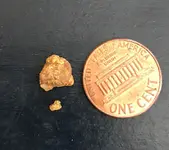Good to see you are still working Greaterville Chris.

The gulches in Greaterville have been worked extensively by hand. The method was to dig a pit to the shallow gravel pay layer on bedrock and then to attempt to drift mine those 6 or so inches of gravel back away from the bottom of the pit. As you know bedrock is anywhere from a few inches deep near Granite mountain and up to 6 feet deep near Kentucky Camp.
Most of this small pit mining was done by the Hummel family in the 1930 - 1960 period. For reasons too complex to get into here they had a need to keep their mining out of the public eye so they used small teams of Mexican laborers to dig by hand. The method was to remove all the overburden in a 6 - 10 foot circle without processing then working the pay gravel with water.
All that overburden had considerable gold in it but was discarded willy nilly. In the Greaterville gulches the gold is often spotty and random. Partially because of the way the overburden was scattered and partially because the locals know to look for a rich spot on the surface, work it until it plays out, and then move on to sample, sample, sample until they find another surface concentration. If the locals have worked a spot it will appear barren while a few feet away you may find good gold in a small area.
In the gulches it rarely pays to try to reach bedrock. There are still some of the rich bedrock level gravels left but finding where those unworked gravels are is an exercise in futility. In the gulches the most productive method is to pan sample the surface in a 6 foot or so grid until you find a rich spot, work that spot with water until the pay ends and start sampling again.
If you are interested in working bedrock there are a few areas up on the ridges that produce good gold on bedrock but as I'm sure you know solid bedrock is a few feet down through rotten shaley rock. That stuff is tough to work and process with anything but a metal detector. The largest nuggets in the southwest are found on those ridges but they have been detected by the best. A tough act to follow unless you are a master detectorist.
Greaterville is a difficult deposit to prospect. Great gold but if you try to use conventional prospecting logic you will be left scratching your head. Add that to the fact that water is scarce and drywashing is futile and you end up with a lot of confused and frustrated prospectors. Study the history of the mining methods there and you will have much more productive prospecting trips.
Heavy Pans
Barry





